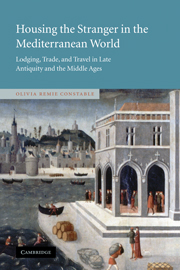 Housing the Stranger in the Mediterranean World
Housing the Stranger in the Mediterranean World Book contents
- Frontmatter
- Contents
- List of illustrations
- List of maps
- Acknowledgments
- Introduction: A culture of travel: words, institutions, and connections
- 1 “Accepting all comers”: a cross-cultural institution in late antiquity
- 2 The transition from Byzantium to the Dār al-Islām
- 3 Commerce, charity, community, and the funduq
- 4 Colonies before colonialism: western Christian trade and the evolution of the fondaco
- 5 Conquest and commercial space: the case of Iberia
- 6 Fondacos in Sicily, south Italy, and the Crusader states
- 7 Changing patterns of Muslim commercial space in the later middle ages
- 8 Christian commerce and the solidification of the fondaco system
- 9 The fondaco in Mediterranean Europe
- Conclusion A changing world: new peoples and institutions in the early modern Mediterranean
- Selected bibliography
- Index
4 - Colonies before colonialism: western Christian trade and the evolution of the fondaco
Published online by Cambridge University Press: 27 August 2009
- Frontmatter
- Contents
- List of illustrations
- List of maps
- Acknowledgments
- Introduction: A culture of travel: words, institutions, and connections
- 1 “Accepting all comers”: a cross-cultural institution in late antiquity
- 2 The transition from Byzantium to the Dār al-Islām
- 3 Commerce, charity, community, and the funduq
- 4 Colonies before colonialism: western Christian trade and the evolution of the fondaco
- 5 Conquest and commercial space: the case of Iberia
- 6 Fondacos in Sicily, south Italy, and the Crusader states
- 7 Changing patterns of Muslim commercial space in the later middle ages
- 8 Christian commerce and the solidification of the fondaco system
- 9 The fondaco in Mediterranean Europe
- Conclusion A changing world: new peoples and institutions in the early modern Mediterranean
- Selected bibliography
- Index
Summary
When the Iberian Jewish traveler Benjamin of Tudela arrived in Alexandria in 1165, he was struck by the busy commerce of the city, by the many foreign merchants doing business there – especially Latin Christians – and by the fact that each foreign “nation” possessed its own funduq. He described Alexandria as:
a commercial market for all nations. Merchants come thither from all the Christian kingdoms. On the one side, from the land of Venice and Lombardy, Tuscany, Apulia, Amalfi, Sicily, Calabria, Romagna, Khazaria, Patzinakia, Hungary, Bulgaria, Ragusa, Croatia, Slavonia, Russia, Germany, Saxony, Denmark, Kurland, Ireland, Norway, Frisia, Scotland, England, Wales, Flanders, Hainault, Normandy, France, Poitiers, Anjou, Burgundy, Maurrienne, Provence, Genoa, Pisa, Gascony, Aragón, and Navarre. And towards the west, under the sway of the Muslims: al-Andalus, Algarve, Africa, and the land of the Arabs. And on the other side India, Zawilah, Abyssinia, Libya, Yemen, Shinar, Syria; also Javan, whose people are called the Greeks, and the Turks … And the city is a busy one and full of traffic. Each nation has a funduq of its own.
Benjamin's comments have been criticized as exaggerated and unlikely, and it is indeed doubtful whether such a broad spectrum of foreign merchants were active in Alexandria in the second half of the twelfth century. Nevertheless, there is good contemporary documentation to support the core of his observations, that a number of western Christian merchant groups (as well as Muslim and Jewish traders) had colonies and enjoyed rights to funduqs in Alexandria in this period.
- Type
- Chapter
- Information
- Housing the Stranger in the Mediterranean WorldLodging, Trade, and Travel in Late Antiquity and the Middle Ages, pp. 107 - 157Publisher: Cambridge University PressPrint publication year: 2004
